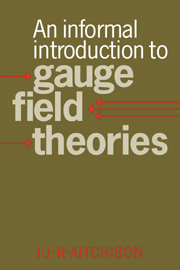Book contents
- Frontmatter
- Contents
- Preface
- Preface to the Paperback Edition
- 1 Introduction and motivations
- 2 Symmetries in quantum field theory: I Manifest
- 3 Gauge fields and the gauge principle
- 4 Quantisation of vector fields: I Massless
- 5 Quantisation of vector fields: II Massive
- 6 Symmetry in quantum field theory: II Hidden
- 7 Theory of weak and electromagnetic interactions
- 8 Renormalisation matters
- References
- Index
5 - Quantisation of vector fields: II Massive
Published online by Cambridge University Press: 20 January 2010
- Frontmatter
- Contents
- Preface
- Preface to the Paperback Edition
- 1 Introduction and motivations
- 2 Symmetries in quantum field theory: I Manifest
- 3 Gauge fields and the gauge principle
- 4 Quantisation of vector fields: I Massless
- 5 Quantisation of vector fields: II Massive
- 6 Symmetry in quantum field theory: II Hidden
- 7 Theory of weak and electromagnetic interactions
- 8 Renormalisation matters
- References
- Index
Summary
The quantum theory of massive vector fields might be expected to be considerably easier than that of massless vector fields, since all the troubles attendant on unphysical degrees of freedom, which follow from a covariant approach to a vector field theory possessing a gauge-in variance, are presumably absent in a massive theory which, as we pointed out in Section 3.2, should have no such invariance. While this is perfectly true for the conventional massive vector field (Section 5.1 below), it turns out to be also irrelevant for, as we briefly indicated in Chapter 1, theories involving such fields are non-renormalisable – i.e. not calculable beyond lowest-order perturbation theory. We shall say more about this in Section 5.2. However, it is a remarkable fact that there exists one special class of massive vector field theories which is renormalisable – that in which there is a gauge symmetry present, but of the ‘hidden’ variety. In this case, as we shall see, the gauge fields do acquire mass, but renormalisability is not prejudiced. The GSW theory (Chapter 7) is of just this type. It might be expected, then, that the theory of this particular sort of massive vector field (the only acceptable possibility, presumably) would resemble quite closely the massless case, which is why we discussed the latter first. We shall approach the massive theory from this point of view, leading up to the discussion of hidden gauge symmetry in Chapter 6.
Information
- Type
- Chapter
- Information
- An Informal Introduction to Gauge Field Theories , pp. 58 - 70Publisher: Cambridge University PressPrint publication year: 1982
